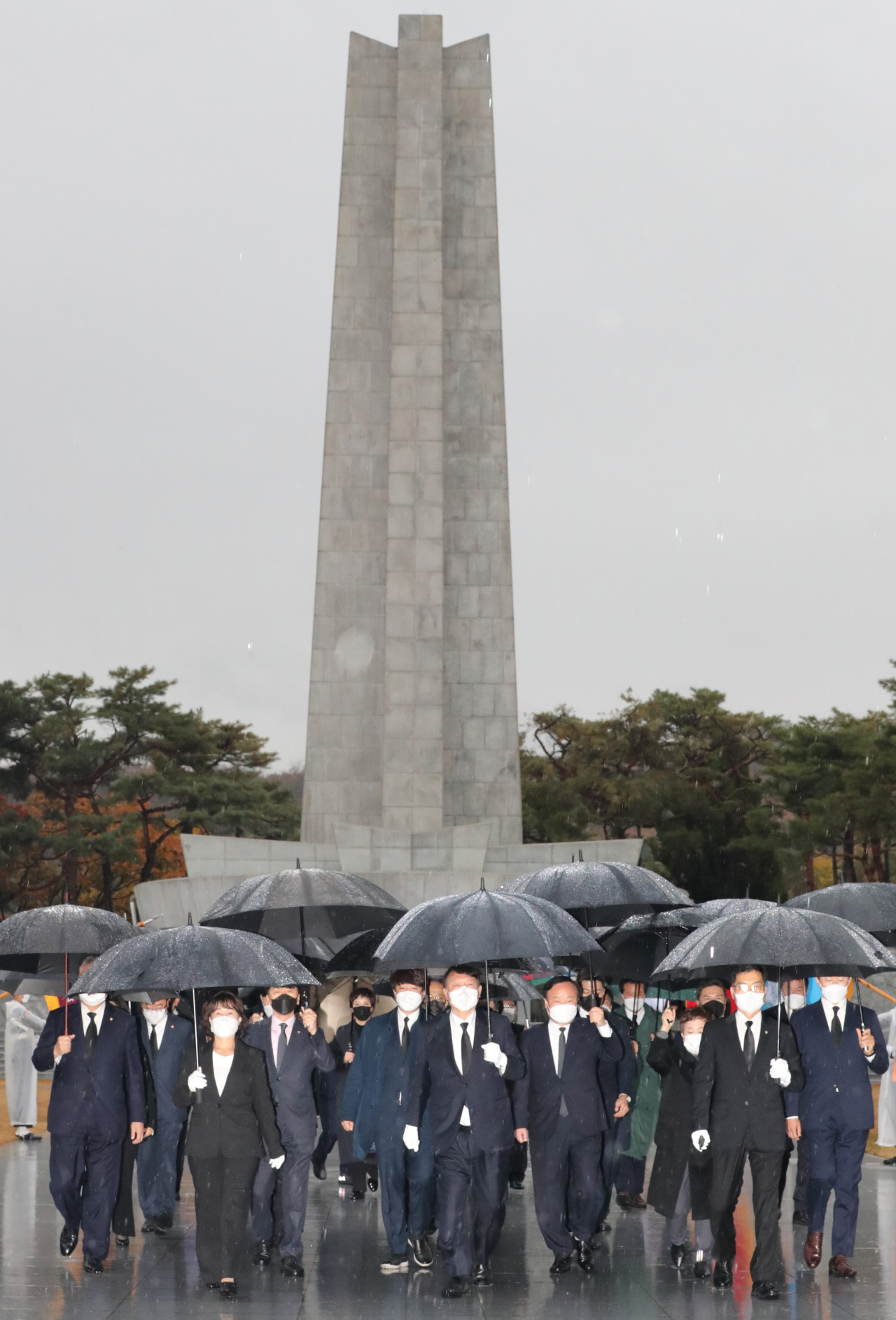South Korea’s two presidential front-runners -- Lee Jae-myung of the ruling Democratic Party of Korea and Yoon Seok-youl of the major opposition People Power Party -- paid their respects at the Seoul and Daejeon national cemeteries soon after winning their parties’ primaries.
“The state’s first duty is the security to protect the national community,” Lee said during his visit to the Daejeon National Cemetery on Oct. 11, a day after winning the primary.
“Of course, I thought it would be only right to pay my respects to those who sacrificed themselves for the national community first.”
On Nov. 8, three days after the People Power Party’s primary, Yoon appeared at the Seoul National Cemetery.
“Following the minds of patriotic martyrs, we will open a new era of people’s victory,” he wrote in the guest book after laying the wreath.
It is a familiar sight for political heavyweights to head to national cemeteries at important moments, especially ahead of elections.
For instance, all party leaders visited the Seoul National Cemetery on Jan. 1 last year in anticipation of the parliamentary election in April. President Moon Jae-in went to the Seoul National Cemetery as he began his presidential election campaign on April 4, 2017, a day after he won the Democratic Party’s primary.
The act of visiting national cemeteries holds great significance for politicians, according to experts.
“For politicians, going to a national cemetery where the dead are buried seems to cause a very powerful phenomenon that creates emotional sympathy for voters or the public who support them,” said Ha Sang-bok, a professor of politics and media relations at Mokpo National University.
“By paying their respects to the late politicians buried at the national cemetery, politicians can show a certain political legitimacy to those who support the dead. I look at it as a very important process of political symbolization.”
Ha noted that other countries have similar practices, since it creates a political halo effect, but said visiting national cemeteries is more common in Korea.
“In the Joseon era, there were various political conflicts and struggles centered around the dead. I think that political DNA is engraved in Koreans,” he said.
“Politicians have a desire to elevate their political justification and legitimacy. So visiting a national cemetery is a representative case and it goes the same for visiting the houses of late political figures and other places that are related to the dead.”
For politicians, going to a national cemetery makes perfect sense as it shows that they want to make the country better.
“(Politicians) regard national cemeteries as the root of the country. I don’t think it’s unusual because it’s where people who sacrificed themselves for the country are buried, regardless of political faction,” said Yoon Tae-gon, a political analyst at Themoa, a think tank on political issues.
As to the reason politicians pay their respects at the graves of former presidents at the Seoul National Cemetery, Yoon said they are trying to show people they espouse similar political beliefs.
“(Visiting former presidents’ graves) is to confirm that they are legitimate successors. It also has the effect of appealing to their supporters,” he added.
Kim Myung-hee, an associate professor of sociology at Gyeongsang National University, wrote in the journal Emotion Studies in 2019 that politicians are “evaluated by the way they feel about certain events, not how they see it.”
Politicians appeal to voters through emotion rather than causes and beliefs, she said.
By Kan Hyeong-woo (
hwkan@heraldcorp.com)








![[Today’s K-pop] Blackpink’s Jennie, Lisa invited to Coachella as solo acts](http://res.heraldm.com/phpwas/restmb_idxmake.php?idx=644&simg=/content/image/2024/11/21/20241121050099_0.jpg)